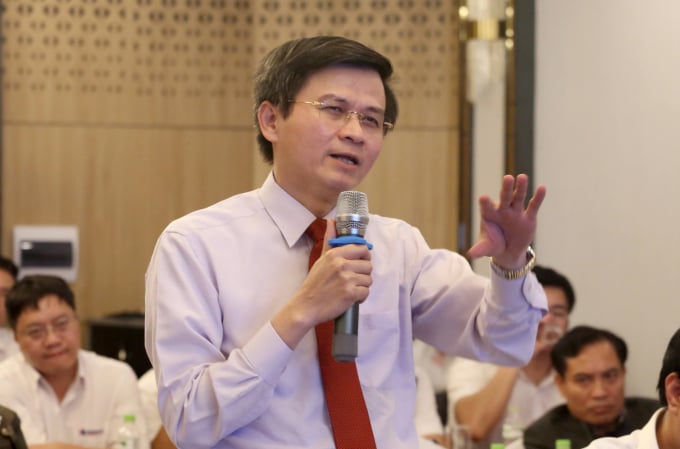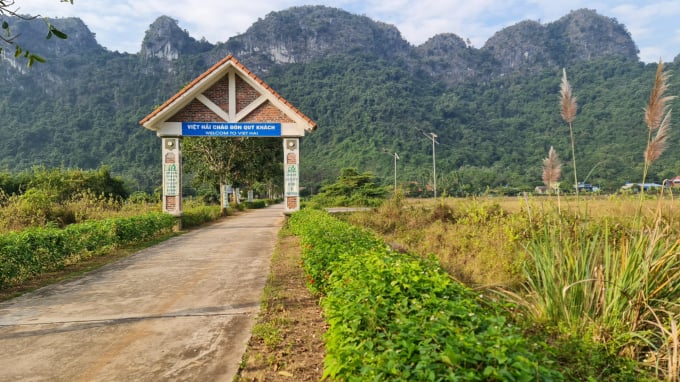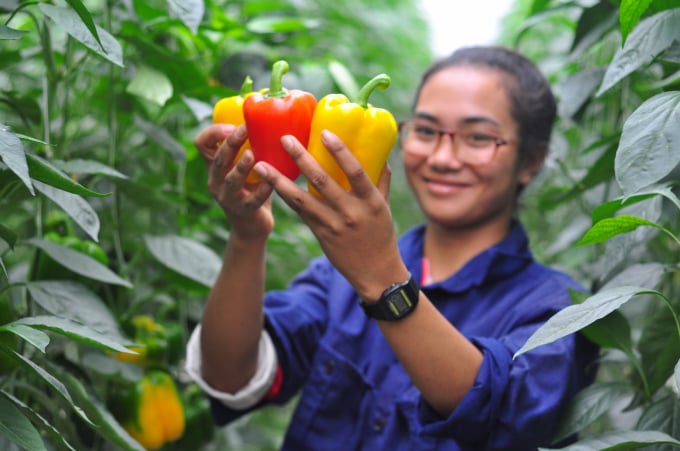November 24, 2025 | 21:35 GMT +7
November 24, 2025 | 21:35 GMT +7
Hotline: 0913.378.918
November 24, 2025 | 21:35 GMT +7
Hotline: 0913.378.918
In a discussion with the topic " Develop agriculture - countryside - farmer with new mindset and approach", Dr. Doan Minh Huan, Member of the Party Central Committee, Editor-in-chief of the Communist Review, shared, “Developing ‘agriculture - countryside - farmer’ requires modern market economic thinking, local action - global vision. Market thinking must be associated with shaping feelings and responsibilities towards farmers, making them the central figure of rural development.”

Dr. Doan Minh Huan, Member of the Party Central Committee, Editor-in-chief of the Communist Review.
There is a fact that investment in agriculture brings wealth to the people, but the revenue of localities is not as much compared to investment in industry and service.
Investment in agriculture requires fundamentality, taking into account not only the matter of income improvement but also labor restructuring, protection of living environment, and promotion of national cultural identity.
Developing "Ecological Agriculture - Vibrant Countryside - Innovative Farmers" depends on a lot of public investment resources and a wide area across all regions of the country. The more difficult conditions the region has, the more demanding the resources it will be, especially in terms of security, national defense, and equality among ethnic groups. These large investments cannot be measured purely through economic efficiency.

"All levels, from leaders to people, must be profoundly aware of the responsibility to protect the ecological environment, for the green and sustainable agriculture, for the quality of life," said Dr. Huan.
A leader who lacks affection, understanding and empathy for farmers can hardly form innovative thinking to develop “agriculture - countryside - farmer”.
That's because resources for industrialization and urbanization are almost drawn out from the “essence” of agriculture (human, material, financial, land, etc.), leaving behind the pollution, "pushing" it all for farmers and villages to bear: wastewater discharge sites, industrial and urban domestic waste dumps, construction of cemeteries,…
Many rural areas are left with mostly old people and children, suffering a severe shortage of young, skilled, and well-trained workers, lacking the capacity to transform into modern agriculture and develop rural economic sustainably. Rural village culture, family, lifestyle change rapidly, intertwined between positive and negative. Many aspects of cultural identity are affected as followed.
Developing ‘agriculture - countryside - farmer’ therefore requires modern market economic thinking, local action - global vision as well as the wisdom and conscience from leaders - those who must always dedicate and put the ‘heart’ and ‘brain’ into serving the people.
All levels, from leaders to people, must profoundly be aware of the responsibility to protect the ecological environment, for green and sustainable agriculture, for the quality of life.
Dr. Doan Minh Huan, Editor-in-chief of the Communist Review
Apart from popularity, locality and ethnicity should also be well-considered. Scientific knowledge and local knowledge must go hand in hand and become a "power duo". The reason “One Commune One Product” (OCOP) products have high value when sold in the market is mainly thanks to the crystallization of indigenous resources and local knowledge.

"It is necessary to attract well-trained students who are passionate about agriculture to come to the countryside and start a business by offering preferential mechanisms," said Dr. Huan.
The role of farmers as the central figure of the ‘agriculture - countryside - farmer’ development can only be guaranteed when the capacity of each factor is increased respectively through legal entities, forms of association and cooperation, creating community strength as a whole. This includes cognitive capacity and behavioral capacity, individual capacity and organizational capacity.
Smallholder farmers only existing in a small and isolated form may face losses in many aspects, unable to cope with challenges or make full use of present opportunities to develop in a world of modern market economy and international integration.
It is essential to renew agricultural engineer training academies with a strong focus on training practical engineers, where at least 50% of the time must be spent on scheme formulation and project practice to train students into “new generation” farmers.
The scheme must identify the land fund, the mechanism for obtaining said land fund, the production organization model as well as the input and output, the technology applied, the selected market, the address of funding and guarantees. And then those aspects must all be put into experiment.
In short, the new approach is to develop ecological agriculture with diversified values in line with rural economic development. Civilized rural development is closely linked with urbanization and the connection between rural and urban spaces. The civilized farmer class is the true center of agricultural economic restructuring and rural development.
Translated by Samuel Pham

(VAN) Viet Nam is entering the pivotal period of 2025-2030, moving toward the formulation of the Remote Sensing Law, which will establish a legal foundation for the development of national digital data.

(VAN) The agricultural sector is finalizing the strategic framework for emission reduction, setting the goal of sharply cutting methane and 403.7 million tons of CO2 equivalent and moving toward Net Zero by 2050.
/2025/11/22/2236-1-153832_483.jpg)
(VAN) The National Marine Spatial Planning is opening up opportunities for sustainable blue sea development across 21 coastal localities.

(VAN) Viet Nam’s forestry sector is undergoing a comprehensive transformation, strengthening management, protection, and development efforts to maintain ecological security and drive green, sustainable growth.

(VAN) Viet Nam is accelerating efforts to digitize reservoir operations, from real-time data to hydraulic modelling.
/2025/11/21/3348-2-102623_454.jpg)
(VAN) National Assembly delegate Nguyen Thi Lan has proposed adding special mechanisms to attract human resources to the agricultural, forestry, and fishery sectors, addressing the shortage of high-quality personnel.

(VAN) Over the past two decades, the unified legal framework for water resource management has been perfected, becoming a crucial foundation for ensuring national water security.